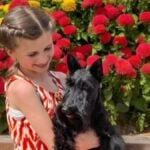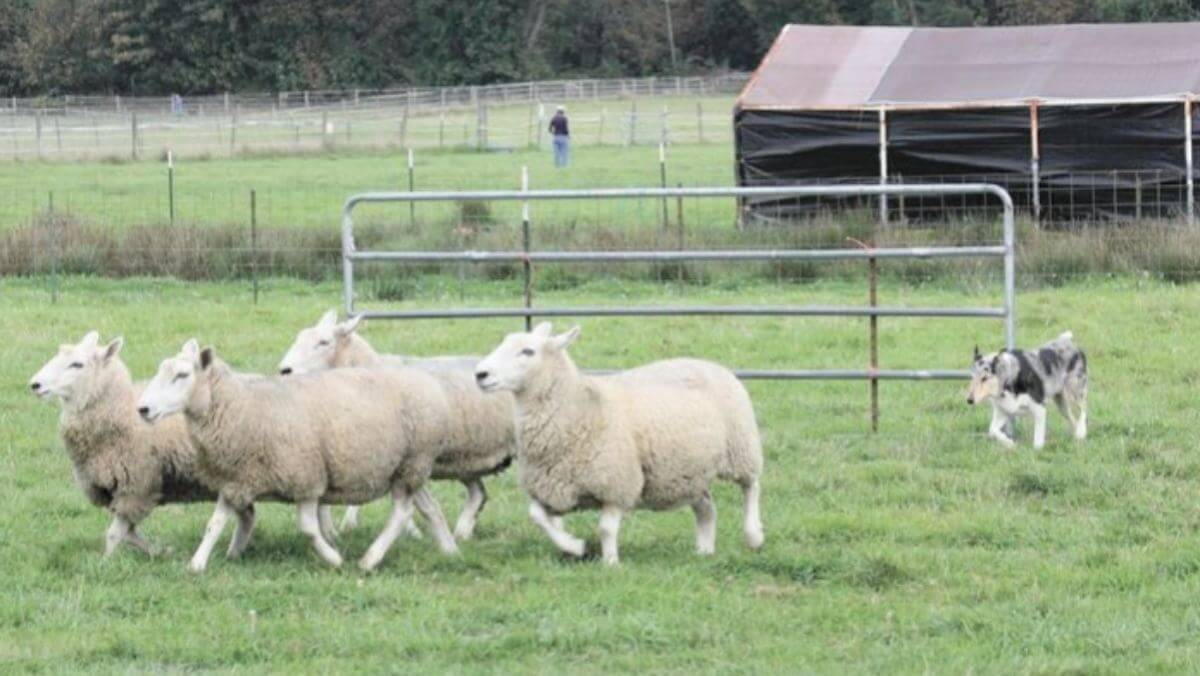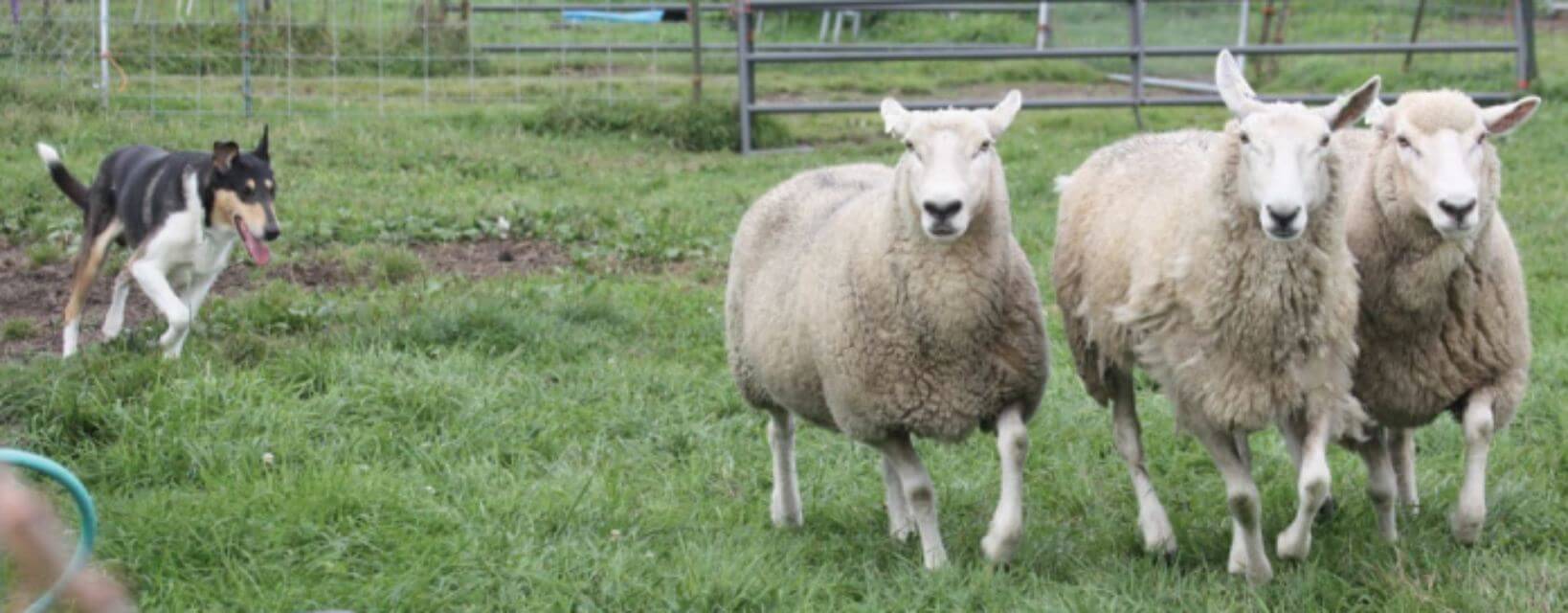
Home » Beyond the Show Ring: Breeders With a Multi-venue Focus

This article was originally published in Showsight Magazine, August 2014 issue.
For Shelley Bergstraser of Wild Wind Collies, it all started with a “mostly collie” that she competed with in 4H. Bergstraser explained that she had begged her parents for a dog, “and when I grew up, my poor husband didn’t know what he had gotten himself into when he agreed to buy five acres.”
Michelle Shoemaker, Wyndham Collies, grew up dreaming about having a collie. Years later, she asked her husband to drive past the home of Jim and Peg Vohr because she wanted to see where Ch. Shamont Stormalong was buried. As they drove past, a group of collies ran up to the front yard fence, and Shoemaker insisted that they stop the car. They met the Vohrs, and the couples ended up spending the evening visiting with each other. The following year, Shoemaker bought a puppy from the Vohrs, whom she named Jasmine.
While some breeders focus exclusively on the show ring, others find themselves also drawn to companion and performance events. In Shoemaker’s case, after showing Jasmine to her championship, Shoemaker discovered agility. Jasmine became not only Shoemaker’s first breed champion but also her first agility dog, herding dog, and obedience dog, and the dam of Shoemaker’s first litter.
While the first collie Bergstraser purchased didn’t finish, “I was bitten by the [show] bug and then more collies were added.” To date, Bergstraser has produced nearly 60 breed champions. However, obedience was Bergstraser’s first love, and it eventually led her to herding and agility as well. Bergstraser, in fact, makes her living from obedience training as the owner of Canine Solutions Dog Training Center in Colorado Springs, Colorado.
Linda Marie Ward’s path to showing began with a sable rough dog named Neeko, who Ward credits with teaching her to show. Ward, who with her daughter Tanya comprises Sinkona Collies, points out that this was the early 1970s, before other performance options became available. After owning and showing several more collies, Ward changed direction with her breeding program. She leased a champion, herding-titled bitch and bred her to a dog with herding, tracking, and obedience titles. Ward kept Kit, a tri smooth bitch from that litter, who went on to earn her breed championship as well as obedience, herding, and agility titles, and who became foundation bitch of Ward’s
smooth line.
These are some of the breeders who strive towards producing puppies capable of earning the proverbial “titles at both ends.” In selecting their breeding stock, they aim to choose collies who will produce show prospects which also have the talent and temperament to excel at jobs outside the show ring.
Shoemaker states that she has stayed within the same family of dogs since she started with Jasmine. “Their temperament suits my temperament,” she stated. “Different lines have different temperaments, and you have to find the family that suits you.” In picking puppies to keep for her breeding program, Ward looks for intelligence and elegance, as well as a good body. Bergstraser stated that she looks for temperament, attitude, and work ethic. “These dogs should be alert, full of sense. They should be intelligent. They should be extremely easy to train. A collie with a good work ethic not only has to have an active mind and be interested in going and doing things, they need to have a willingness to work with you.”
Both Bergstraser and Ward note that great bodies are something they strive for in their breeding program. Bergstraser observed that some breeders focus on the headpiece to the exclusion of structure. “I think that is wrong. I think it’s been proven not just by me but by many breeders that you can breed an all-around dog. You can breed a dog with a beautiful body and very pretty head.”

Shoemaker cautions that the starting point for any prospective future conformation and performance star needs to start with conformation. “In choosing a puppy, it has to be a pretty puppy. You can train so much and teach a puppy how to learn and how to love to participate in things. But you can’t fix them if they don’t fit the standard. I can’t compromise on that part. It’s important that we have dogs that meet the standard.”
Kathy Moll, Deep River Collies, performs puppy aptitude testing and herding testing on her pups in addition to a detailed structural evaluation to aid her in selecting puppies for her breeding program. She looks for a moderate- to high-drive puppy who prefers people to other dogs, is willing to please, and has “presence.” Moll notes that she finds these traits equally important in both conformation and performance prospects.
Currently, Shoemaker is trying to decide if she wants to do more breeding than she has been. She only breeds when she wants a dog for herself, and she likes to have her own litter because that allows her to have first choice of puppies to keep. She stated, “It’s fun to produce a puppy that can change how other people feel about dogs and what they do.” Shoemaker added that while she has not bred enough puppies to feel like she has done that with her own litters, she has helped steer people towards the right puppy for them, “and that opens their eyes to all these other venues, and they end up doing things with their dogs that they never thought they could do. I want to share the joy of that kind of dog.”
Bergstraser notes that many of her puppy buyers compete in agility and want an active, high-drive dog. “They say they want a dog that would be a problem in the average pet home,” she explained. Bergstraser wants the drive but also wants a dog with focus. She stated that she currently has a “very busy” young puppy who would rather follow her around than play with other dogs, and she appreciates that kind of focus and attention. Bergstraser cautioned, however, that in breeding for high-drive, active collies, it’s important not to lose the sweet temperament that the breed is known for. “A good collie should have an off switch. They should be able to come in the house, lay down, and kick back and be a good dog.”
“Our standard is one of the most descriptive standards in the body and movement section,” states Bergstraser. “It is as descriptive of body and movement as it is of heads. To have a dog that can do advanced performance work, you’ve got to have a good structure.” Bergstraser also believes that good structure has allowed collies to be more competitive at all-breed shows at the group level. “You’ve got to have a dog that is sound and physically able to gait like a herding breed should gait to be successful in the Group and Best in Show ring.”
Moll stated that she believes the overall quality of collies has improved in recent years, both in conformation and temperament. “Most collies are outgoing, steady, and animated these days,” she said. Shoemaker stated that the improvements breeders have made in the overall soundness of the breed were on display at this year’s Collie Club of America (CCA) national specialty, and that the agility trial showcased “wonderful working dogs.”
In addition to being one of the larger breed nationals, the CCA national specialty includes collie-only herding tests and trials, agility, obedience, and rally events. A significant number of collies compete in multiple events during the national, and some compete in every venue. Shoemaker notes that while she never feels like she’s in a hurry in her training, she does feel a bit of stress preparing for a national when she is trying to get multiple collies ready to compete at an advanced level in multiple venues.
Moll stated that she currently trains and shows her collies in obedience. However, friends show them in conformation, herding, and agility since a worsening back condition has made training and showing difficult for Moll.
Bergstraser said that at one time, she went to shows nearly every weekend, particularly while her daughter Laura competed as a junior handler. Fortunately for her, Laura has since become a professional handler and now travels with the collies that they show in the breed ring. This has allowed Bergstraser to focus on obedience and herding.
Ward explains that she manages to compete successfully in multiple venues because, “I don’t have a life. Dogs are about all I do.” She adds that she and her daughter Tanya are involved together in breeding, training, and competing with their dogs. Activities with the dogs are how they spend their time outside of their full-time jobs.
Ward’s goals changed suddenly this past year when she suffered the tragic loss of Tara, her breed champion blue bitch. With Tara, Ward had earned obedience, herding, and agility titles, while the team was working towards several other titles. This summer, Ward has been looking after Tara’s littermate Zorro for his owner Heidi Braun and has been training him in herding and agility. Already a herding-titled breed champion, Zorro recently earned his first novice agility leg, and Ward looks forward to trialing him in herding this fall.
Shoemaker notes that while she finds there is a natural ebb and flow to her training, different collies take precedence at different times. She loves every venue they participate in. Currently, she has three collies training in all venues, and her goals for this year include completing a UD on her triple champion rough dog Scooter and an intermediate herding title on Gabby, who has already earned a breed championship and agility MACH.
This year, among other goals, Moll is looking for one more Advanced A Ducks qualifying score for her sable rough champion Charlie. Bergstraser is looking forward to trialing her champion, obedience-titled bitch Deuce in advanced herding.
Bergstraser stated that among her most treasured accomplishments was earning an Advanced A Course Sheep title on Aero, who also has a breed championship and CDX, among other titles. “Herding is a passion to me,” Bergstraser said. “Watching dogs do what they were bred to do is addictive, and it’s intoxicating to watch a great herding dog. There’s no greater joy than watching these beautiful dogs do what they were bred to do.”
Bergstraser notes that while the best chances of getting a talented herding collie is by selecting a puppy from parents who were good herding dogs, the collie breed is such an old breed that herding ability can be found throughout the breed. “You can find superstar herding dogs that came from totally show lines but turn out to be amazing herding dogs. That’s something I so admire about the breed,” she said.
Ward notes that collies are bred for more than just winning in the breed ring. “The collie is supposed to be a ‘head breed,’ but they’re also a herding dog, and they have to be able to work.”
Shoemaker adds that she believes choosing a good breeder is important. She wishes more performance competitors recognized the value of getting a dog from a breeder. “Collie breeders find breeding good, healthy animals to be important,” she stated. “When you buy a dog from a good breeder, you know what you are getting, and you know what to expect. You should know the health issues, and a reputable breeder stands behind their dogs.”
Moll says that along with the achievements of the collies she has bred, she considers one of her major achievements as a breeder to be the people she helped to get a start in collies. Although continuing to pursue her breeding program, she adds, “I live vicariously through my younger friends who have collies from me.